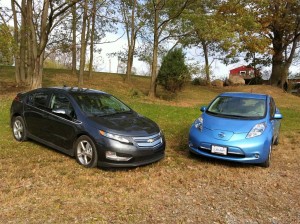A new report by the Insurance Institute for Highway Safety should calm those concerned about the safety of the new battery car technology. After a series of crash tests, the IIHS has awarded the Nissan Leaf and Chevrolet Volt its highest safety ratings
The trade group says the results – which came from the first test of mainstream battery-powered vehicles – shows that the industry is putting the same focus on safety engineering for the new vehicles that is going into today’s more conventional vehicles.
Volt and Leaf not earned the institute’s top, “Good” rating in front, side, rear and rollover crash protection, but were named IIHS “Top Safety Picks.”
“What powers the wheels is different, but the level of safety for the Volt and Leaf is as high as any of our other top crash test performers,” said Joe Nolan, IIHS chief administrative officer.
The IIHS results add to the series of awards garnered by the Chevy and Nissan battery cars since their introduction in December. Just last week, Leaf was named World Car of the Year by a panel of 66 automotive journalists from around the world. Volt took honors as World Green Car, and was named North American Car of the Year by U.S. and Canadian journalists in January.
But the results of the crash tests and the endorsement of the IIHS could prove particularly helpful as there have been concerns raised about a vehicle carrying around hundreds of pounds of high-voltage battery packs.
Ironically, that weight actually may have helped the two vehicles, noted an IIHS news release, since “Larger, heavier vehicles generally do a better job of protecting people in serious crashes than smaller, lighter ones because both size and weight influence crashworthiness.”
The Chevy and Nissan vehicles fared notably better than a pair of low-speed battery cars the Insurance Institute tested last year. The golf cart-like Gen e2 and Wheego Whip were put through side impact tests for research purposes. As they aren’t subject to the same, strict federal mandates that mainstream products like the Chevy Volt and Nissan Leaf face, both offer more limited impact protection – and the test data showed that test dummies suffered what would have been severe to fatal injuries in real humans.
“Eco-minded drivers keen on switching to electric would do well to buy a Leaf or Volt for highway driving instead of a low-speed vehicle if they’re at all concerned about being protected in a crash,” Nolan cautioned.
So far this model-year, the IIHS has awarded Top Safety Pick honors to 80 vehicles, including seven relatively conventional hybrids. General Motors has 12 vehicles on the list, including Volt, while the Leaf brings Nissan’s tally to three.

